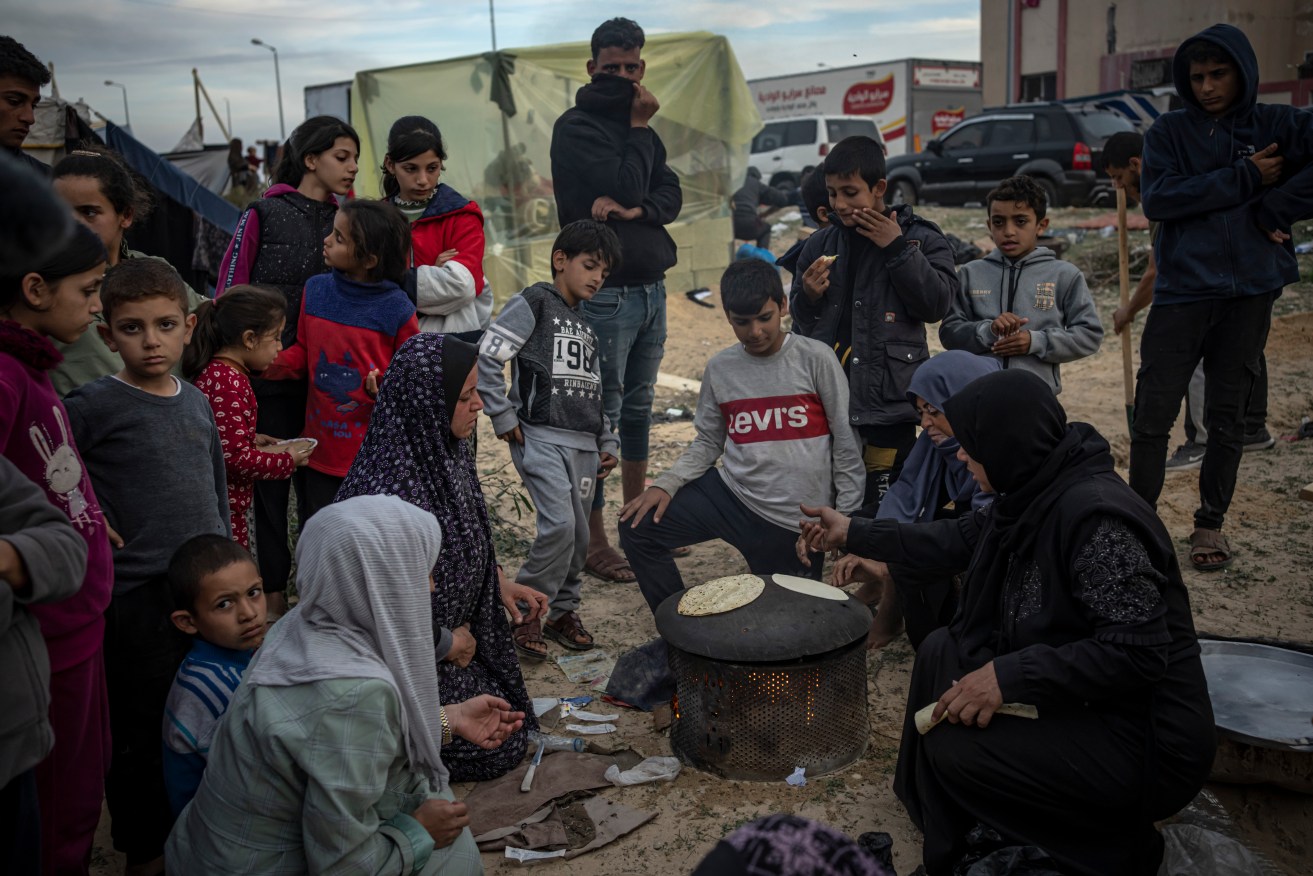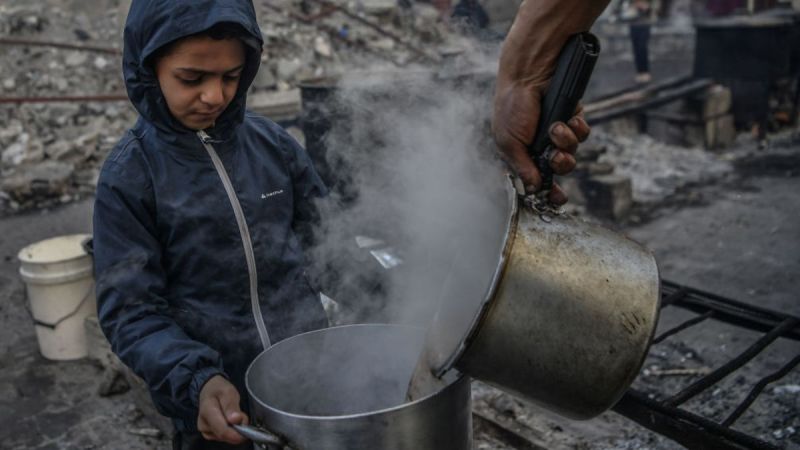Extract from The New Daily


Palestinians make do with the little food they can find in ravaged Gaza. Photo: AAP
The UN Security Council has demanded both sides of the Israel-Hamas conflict allow crucial aid into Gaza at scale amid fears of looming mass starvation and famine.
The aid resolution was passed on Saturday morning (AEDT), with 13 Security Council members, including the UK and China, voting in favour.
After the vote, UN chief Antonio Guterres warned that “four out of five of the hungriest people anywhere in the world are in Gaza”.
“According to the World Food Programme, widespread famine looms,” he said.
“More than half a million people – a quarter of the population – are facing what experts classify as catastrophic levels of hunger.
“And clean water is at a trickle.”

A boy displaced in Gaza receives food delivered by volunteers. Photo: Getty
After days of delays, the United States and Russia both abstained rather than block the flow of supplies to Palestinians.
The watered-down resolution did not call for an immediate ceasefire, but instead urged to “create conditions” for one, the BBC reports.
US Ambassador to the UN Linda Thomas Greenfield said the US abstained because of a failure to condemn Hamas’ attack.
“Ultimately, while we are encouraged that the Council spoke out on this humanitarian crisis, we’re deeply disappointed — appalled, actually — that once again, the Council was not able to condemn Hamas’ horrific terrorist attack on October 7.”
Russia objected to the resolution being watered down from its initial ceasefire demand.
Starvation and famine fears
The vote comes amid warnings that Gaza’s population faces starvation and the risk of famine.
A report this week outlined “catastrophic levels of acute food insecurity across the Gaza Strip”.
“There is a risk of famine and it is increasing each day that the current situation of intense hostilities and restricted humanitarian access persists or worsens,” said the UN-backed IPC food agency’s report.
The entire population in the Gaza Strip (about 2.2 million people) is currently classified in food “crisis or worse”.
“This is the highest share of people facing high levels of acute food insecurity that the IPC initiative has ever classified for any given area or country.”
Earlier UN chief António Guterres pointed out the “real problem” preventing aid delivery in Gaza, which was Israel’s offensive.
Guterres said Israel’s attacks were creating “massive obstacles to the distribution of humanitarian aid inside Gaza”.
“A humanitarian ceasefire is the only way to begin to meet the desperate needs of people in Gaza and end their ongoing nightmare,” he added.
Tweet from @UNHumanRights
Ahead of the vote, Israel signalled it was widening the ground offensive with a new push into central Gaza.
Israel’s military on Friday ordered residents of Al-Bureij, in central Gaza, to move south immediately, indicating a new focus of the ground assault that has already devastated the north of the Strip and made a series of incursions in the south.
But the soaring death toll has drawn increasing international criticism, even from staunch ally the United States.
In its latest update on casualties, Gaza’s health ministry said 20,057 Palestinians had been killed and 53,320 wounded in Israeli strikes since October 7.
The Israeli military has expressed regret for civilian deaths but blamed Iran-backed Hamas for operating in densely populated areas and using civilians as human shields, an allegation the group denies.
Artillery blitz
Israel said 140 of its soldiers had been killed since it launched its ground incursion into Gaza on October 20.
In the latest accounts of fighting on Friday, residents reported Israeli tank shelling of eastern areas of Al-Bureij, the subject of the latest military evacuation order.
Israeli forces have previously engaged with Hamas gunmen on the edges of Al-Bureij but have yet to thrust deeper into the built-up area, which grew out of a camp for Palestinian refugees from the 1948 Israeli-Arab war.
Hamas-affiliated Shehab news agency reported heavy shelling and air strikes on Jabalia al-Balad and Jabalia refugee camp, in northern Gaza, and that Israeli vehicles were trying to advance from the western side of Jabalia amid the sound of gunfire.
Air strikes were also reported in Khan Yunis and Rafah in the south.
The Israeli military said in a statement its air force destroyed a long-range missile launch site in Juhor ad-Dik, central Gaza, from which, it said “recent launches into Israeli territory were carried out” — a possible reference to an attack on Tel Aviv on Thursday.
A November 24 to December 1 humanitarian pause helped to increase aid deliveries to Gaza.
The pause led to the release of more than 100 hostages held by Hamas since October 7 and in exchange, 240 Palestinians were freed from Israeli jails.
But in a statement on Thursday, Hamas and Islamic Jihad rejected any deals about exchanges of hostages and Palestinian prisoners “except after a full cessation of aggression” by Israel.
Israeli Foreign Minister Eli Cohen said negotiations on a hostage release were continuing but declined to provide details.
-with AAP
No comments:
Post a Comment